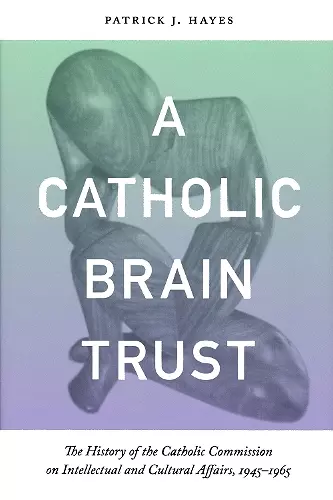Catholic Brain Trust
The History of the Catholic Commission on Intellectual and Cultural Affairs, 1945-1965
Format:Hardback
Publisher:University of Notre Dame Press
Published:15th Jun '11
Currently unavailable, and unfortunately no date known when it will be back

In A Catholic Brain Trust: The History of the Catholic Commission on Intellectual and Cultural Affairs, 1945–1965, Patrick J. Hayes chronicles the founding, development, and accomplishments of the CCICA from its beginnings immediately following the Second World War to 1965. This extensively documented study contributes to the history of American Catholicism by investigating a little-known effort on the part of Catholic intellectuals in the postwar period to shape Catholic identity in the United States, by bringing their individual and collective resources to bear on contemporary society and culture. Hayes demonstrates how a group of leading Catholic professors, college presidents, writers, government officials, scientists, and artists influenced Catholic culture through various media, through educational institutions, and through their participation in ecclesial- or government-sanctioned activities.
After outlining the preliminary background of the CCICA's founding in 1946, Hayes examines its impact through two of its early projects: war relief for displaced scholars and participation in United Nations affairs. From 1948 to 1959, questions of the relationship between church and state especially occupied the Commission. Hayes looks at the impact of the famous lecture in 1955 by Monsignor John Tracy Ellis, "American Catholics and the Intellectual Life," which, more than any single event, served to rally CCICA members, as well as the larger academic community and the American Catholic Church as a whole, around the question of Catholic intellectual identity. Hayes analyzes the CCICA's influence on campus culture in the United States, touching on topics such as academic freedom and projects such as the Kirby seminars for younger scholars, a Catholic registry of academics working in the United States, and the New Catholic Encyclopedia. An epilogue treats the Commission's last years of operation.
“In his history of the CCICA, Patrick J. Hayes concentrates on the organization’s first twenty years, covering its remaining decades in a thoughtful and provocative epilogue.” —The Journal of American History
“Besides being a solid, well-documented institutional history, this book provocatively discusses a number of broader issues. Hayes discusses the concept of the ‘Catholic intellectual’ and the idea of ‘Catholic identity’ in America . . . . Intellectuals of all stripes will find ample food for thought in Hayes’s examination of American Catholic scholars’ struggles to define issues among themselves while fashioning an effective apostolate to the nation and to the world.” —American Historical Review
“Patrick J. Hayes’ splendidly researched book records the short history of The Catholic Commission on Intellectual and Cultural Affairs, an exceptionally interesting project started by a small group of United States Catholic intellectual leaders at the conclusion of World War II. . . . Hayes’ account of CCICA’s noble failure may encourage a new organization that would benefit from the lessons of his exemplary history.” —American Catholic Studies
“Patrick J. Hayes . . . tells the story of the CCICA’s ambitious, uneven, and—in some cases—almost quaint activities during the first twenty years of its existence. This careful study of a little-known but stunningly ambitious effort on the part of American Catholic intellectuals to come of age is the history of American Catholicism in microcosm.” —The Catholic Historical Review
“Patrick Hayes has written a thorough, workmanlike history of the Catholic Commission on Intellectual and Cultural Affairs (CCICA), which first met in 1946 and was dissolved in 2007. . . . He offers a useful snapshot of postwar intellectual life even as he illustrates the difficulty in answering the question “What does it mean to be a Catholic Intellectual?” —The Living Church
“In the decades following World War II, an impressive collection of American Catholic intellectuals joined together to ponder what they believed was an urgent question: ‘What is an intellectual Apostle?’ . . . In A Catholic Brain Trust, Patrick J. Hayes chronicles the history and assesses the achievement of the organization these scholars created, the Catholic Commission on Intellectual and Cultural Affairs (CCICA). Hayes’s thorough and well-documented account reveals a postwar moment ripe for just such an undertaking.” —Commonweal
“Patrick Hayes has written a learned and engaging account of an organization too little known today, even among Catholics. His narrative opens up fresh perspectives on the Catholic 1950s, especially with regard to church-state relations, and helps to frame today’s debates on the role of the Catholic intellectual. An admirably solid achievement.” —Leslie Tentler, Catholic University of America
"This is a work of original archival research, on a subject of great interest to those interested in American intellectual and cultural history and those with an interest in the life and work of the Catholic Church in the United States. The book will add depth and context for contemporary discussion of Catholic higher education, Catholic intellectual life, and American Catholic identity and self-understanding." —David J. O’Brien, University of Dayton
"Patrick J. Hayes has written an important work on the little-known effort of Catholic intellectuals to engage cultural challenges in mid-twentieth-century America. In virtue of the scholarship that lies behind it, the book will be an indispensable reference, and because of the issues that it addresses it will be consulted for what lessons it can provide for what is, after all, a permanent necessity of the Church." —Rev. Joseph A. Komonchak, professor emeritus of theology and religious studies, Catholic University of America
ISBN: 9780268031091
Dimensions: 229mm x 152mm x 25mm
Weight: 757g
440 pages